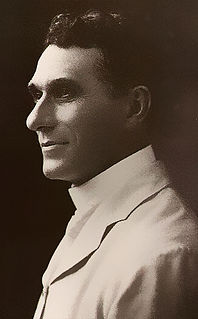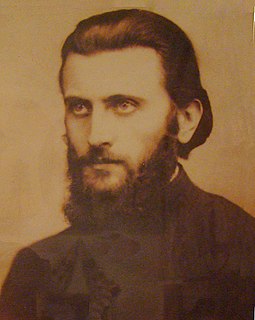A Quote by John of Damascus
All we know if an angel is that it is incorporeal, immaterial, and only by comparing it with God-who is incomparable-can we see that it has some density and body after all, since in reality only God is truly immaterial and incorporeal.
Related Quotes
"God is a spirit." But that does not make him an immaterial being —a being that has no properties in common with matter. The expression "an immaterial being," is a contradiction in terms. Immateriality is only another name for nothing. It is the negative of all existence. A "spirit" is as much matter as oxygen or hydrogen.
To talk of immaterial existences is to talk of nothings. To say that the human soul, angels, god, are immaterial, is to say they are nothings, or that there is no god, no angels, no soul. I cannot reason otherwise: but I believe I am supported in my creed of materialism by Locke, Tracy, and Stewart. At what age of the Christian church this heresy of immaterialism, this masked atheism, crept in, I do not know. But heresy it certainly is.
God cannot be represented by an image. We ought not to think that the Godhead is like unto gold, or silver, or stone, graven by art and man's device. We wrong God, and put an affront upon him, if we think so. God honoured man in making his soul after his own likeness; but man dishonours God if he makes him after the likeness of his body. The Godhead is spiritual, infinite, immaterial, incomprehensible, and therefore it is a very false and unjust conception which an image gives us of God.
Time is only an idea. There is only the Reality. Whatever you think it is, it looks like that. If you call it time, it is time. If you call it existence, it is existence, and so on. After calling it time, you divide it into days and nights, months, years, hours, minutes, etc. Time is immaterial for the Path of Knowledge.
But they that hold God to be [an incorporeal substance]do absolutely make God to be nothing at all. But how? Were they atheists? No. For though by ignorance of the consequence they said that which was equivalent to atheism, yet in their hearts they thought God a substanceSo that this atheism by consequence is a very easy thing to be fallen into, even by the most godly men of the church.
"Blessed are the pure in heart, for they shall see God." Can we see God? Of course not. Can we know God? Of course not. If God can be known, He will be God no longer. Knowledge is limitation. But I and my Father are one: I find the reality in my soul. These ideas are expressed in some religions, and in others only hinted. In some they were expatriated. Christ's teachings are now very little understood in this country. If you will excuse me, I will say that they have never been very well understood.





























